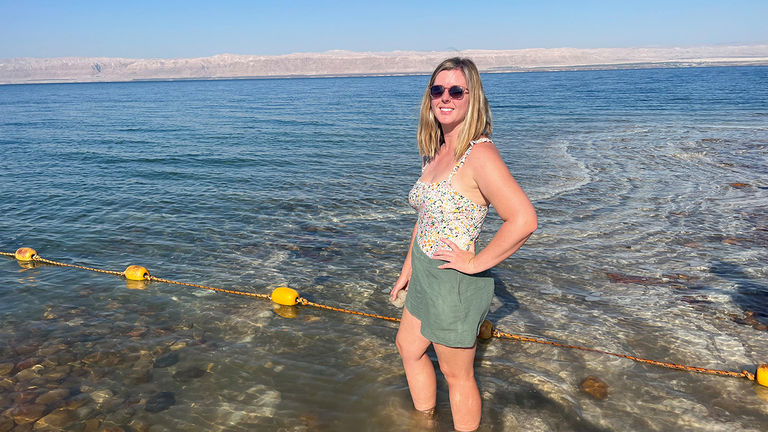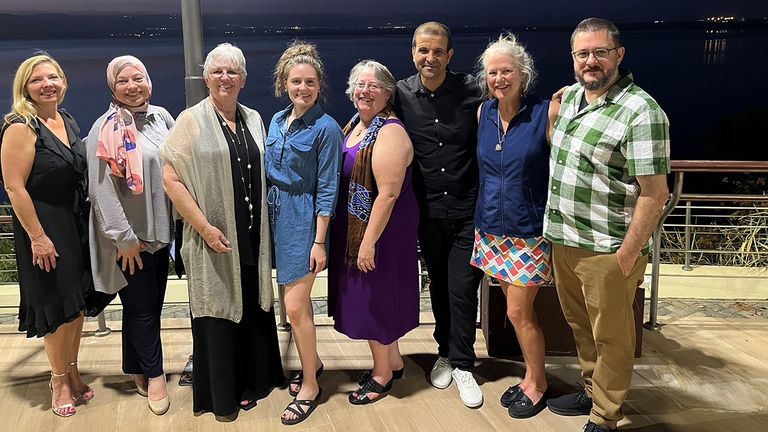During my recent tour of Jordan, I fought droopy eyelids each night in favor of a deep dive through my phone’s camera roll, where I cropped, edited and stitched together a series of photos and videos for social media.
An Instagram reel featuring the ancient Roman ruins of Jerash? Check. A photo of me wandering through the winding slot canyons of Petra? Check.
And I imagined that even after a long day of sightseeing and hotel inspections, most of the others in my tour group — which was made up of 12 North American travel advisors — were likely doing the same.
But here’s where this particular tour strayed from the normal travel advisor fam trip: After posting to my account, I hopped over to a friend’s profile (travel advisor Julie Patterson of @wanderfullyplanned). She was also in Jordan, but was experiencing a completely different itinerary and traveling with a different operator (the day that I explored the ruins of Jerash, for example, she was floating in the Dead Sea). I then hopped over to Gifted Travel Network’s Instagram page, which was also sharing stunningly beautiful Jordan snapshots — in completely different regions of the country.
Not Your Typical Fam Trip
Indeed, this trip to Jordan was no typical tourism board-hosted fam trip; rather, I was part of Visit Jordan’s first-ever Masterclass, a weeklong tour of the country that took place from Sept. 22-29 and included 60 U.S.- and Canada-based travel advisors who were split between five destination management companies (DMCs). I was touring with United Travel Agency (UTA), the oldest-running tour operator in Jordan, while other advisors explored the country with Desert Adventures, Amin Kawar, Why Jordan Tours and Abercrombie & Kent.
Travel advisor Katy Chadwell, founder of Chadwell Traveled, toured with Why Jordan.
“Overall, I am so glad that I had the opportunity to participate in the Masterclass,” she said. “I thought it was well-executed and the format with different groups hosted by DMCs seemed to work. One thing I came away with was just how much Jordan has to offer. I can't imagine spending less than eight days in the destination, and look forward to better educating clients on all that they can do in Jordan and partnering with Why Jordan to make it happen.”
 Chadwell toured the country with DMC Why Jordan.
Chadwell toured the country with DMC Why Jordan.
Credit: 2022 Katy ChadwellMy tour with UTA included three days in the bustling capital of Amman; a day trip to As-Salt (which was named a UNESCO World Heritage Site in 2021); the exploration of ancient cities Jerash and Petra; a tour of Mount Nebo (the alleged burial site of Moses); a stargazing excursion and overnight in a glamping tent in Wadi Rum; and a float in the Dead Sea. Sprinkled in between were visits to several community- and family-led social enterprise initiatives, meals at local restaurants and hotel site inspections.
“Meeting with travel advisors was something we were seriously considering until the advent of the pandemic put it on the backburner,” said Munir Nassar, CEO of UTA, who also invited UTA's group of travelers to his home for dinner during the Masterclass. “When the Jordan Tourism Board suggested a Masterclass, UTA was among the first to sign up.”
A Trip Sparked by Travel Advisor Booking Trends
The Masterclass initiative was organized, in part, to drum up healthy competition among local DMCs who were aiming to win over travel advisor business, and also to connect North American advisors with an on-the-ground partner to help drive direct bookings to the country.
The event itself was the brainchild of Omar Banihani, marketing director for Visit Jordan, who sent out surveys to two groups of travel advisors (one group that was already selling Jordan, Northern Africa and the Middle East, and another group that wasn't). His study revealed two major insights: First, that more clients wanted to visit Jordan on its own (as opposed to combining it with another nearby country, such as Israel or Egypt) and second, that most travel advisors (about 65%) who already sold the Middle East and North Africa were more likely to work with an in-country DMC.
The direct-to-DMC booking pattern preferred by the advisors who were already selling the region served as a jumping-off point for the Masterclass.
“[The survey] sparked some interest with the [Visit Jordan] team,” Banihani said. “A lot of times, we focus on talking to advisors in North America, and on partnering with tour operators in North America so we can do co-op marketing and promotion. I had previously thought that the funnel went from the travel advisor to the North American tour operator to the Jordanian DMC. We’d worked that way for years. But we found out that when [advisors are] selling travel to Jordan, they’re a bit more highly specialized.”
I had previously thought that the funnel went from the travel advisor to the North American tour operator to the Jordanian DMC. We’d worked that way for years. But we found out that when [advisors are] selling travel to Jordan, they’re a bit more highly specialized.
Although Visit Jordan organized the trip’s structure and qualified its advisor participants, Banihani said the event gave the tourism board a way to step back from the process and let on-the-ground operators compete for their piece of the pie: Each applied for inclusion in the program, and the top five who were accepted then designed their own itineraries for the participants.
“A few of the DMCs don’t work much with the North American market, and they saw this as a great opportunity to get started,” he said. “And two have already been working with the North American market, and this was an opportunity to work with them even further.”
The benefits of the experience are already apparent for UTA, which received a request within a week of the Masterclass for small-group travel to Jordan in April 2023.
 Members of UTA's tour group during the closing reception of Visit Jordan's Masterclass.
Members of UTA's tour group during the closing reception of Visit Jordan's Masterclass.
Credit: 2022 Emma Weissmann
A Focus on Meaningful and Responsible Travel
During the trip, Jordan’s DMCs also highlighted the country’s Meaningful Travel Map, which was created in partnership with travel industry nonprofit Tourism Cares. The map highlights 12 social enterprises and experiences throughout the country and includes unique travel opportunities, such as the Jordan Trail, a 40-day long-distance hiking trail beginning in Um Qais in northern Jordan and winding its way to Aqaba in the south, visiting 52 villages along the way.
Masterclass DMCs were encouraged to include social enterprise visits over the course of the week; my tour with UTA included Meaningful Map stops at Bait Khairat Souf (a restaurant and home that provides Jordanian women a platform to financially support themselves) and Wild Jordan, an eco-tourism and crafts center trademarked by The Royal Society for the Conservation of Nature.
“While Jordan has a plethora of sites and natural attractions that travelers explore during their holiday, no visit is complete without getting to know the Jordanians at home — their culture, their enterprises, their beliefs, their family values and, of course, their food,” UTA's Nassar said. “We firmly believe that we must do our best to mitigate as much as possible some of the negative effects that tourism may have on the environment and culture of the country by involving local communities in providing services to visitors. Such communities can then become stakeholders in this industry.”
We firmly believe that we must do our best to mitigate as much as possible some of the negative effects that tourism may have on the environment and culture of the country by involving local communities in providing services to visitors. Such communities can then become stakeholders in this industry.
Partnering With Like-Minded Suppliers
Visit Jordan also sought out thoughtful event sponsors with similar visions, who see the importance of reaching the U.S. traveler and also of promoting meaningful travel to the country.
Partners included Royal Jordanian and Dead Sea Marriott Resort & Spa. Karim Makhlouf, chief commercial officer for Royal Jordanian (RJ), Jordan’s national air carrier, said the airline partnered with Visit Jordan for the Masterclass because it aligned with RJ’s company-wide growth strategy, which includes a heavy focus on the country’s tourism-related offerings.
“As an airline, we’re doing some nonconventional things,” he said. “Focusing on tourism is not typical for an airline, but I strongly believe in it, which is why we work very closely with the Jordan Tourism Board, with the aim of bringing more people into Jordan. This country is undersold in terms of tourism, and its attractiveness is much bigger than the actual number [of people visiting]."
This country is undersold in terms of tourism, and its attractiveness is much bigger than the actual number [of people visiting].
And Muhannad Sabri Hameed, general manager of Dead Sea Marriott Resort & Spa, which hosted the final night’s closing reception, highlighted the importance of the U.S. market to its overall brand. He also noted that the hotel (which is solar-powered) recently updated its sustainability and social-enterprise initiatives, including selling local Jordanian goods in its gift shops and switching from single-use plastic water bottles to reusable water bottles as a provided guest amenity.
“We look forward to the return of travel advisors; we’ve missed them the past two years,” he said. “What we like is that [North American travelers] are easy to deal with, they appreciate the culture, and they want to know local people. You can see the interest and how meaningful it is to them. For us … it’s a win-win.”